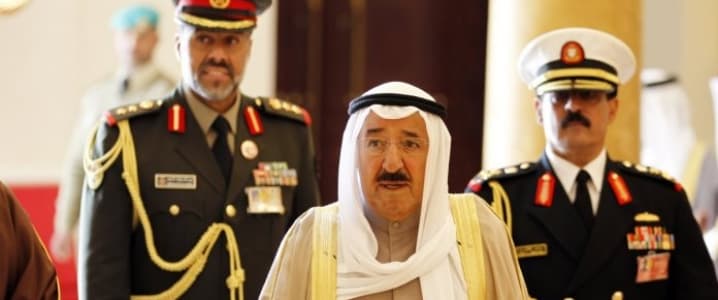Kuwait’s emir Sheikh Sabah al-Ahmad al-Sabah ordered the dissolution of Parliament over the weekend, citing security concerns and “the circumstances in the region”, which includes the oil price crunch and other economic and security worries.
The announcement followed an emergency meeting of the government one day after the speaker of the 50-strong legislature called for early elections, again on the grounds of economic challenges, largely stemming from oil.
Al Jazeera notes that the Parliament had sent three requests to the government for a discussion on the latter’s decision to raise gasoline prices as well as on allegations of administrative and financial violations. The government’s apparent refusal to respond to the requests indicated growing pressure between it and Parliament.
Kuwait, like its neighbors, is almost entirely dependent on oil revenues for its well-being, so the international price crash that started two years ago affected it along with the rest of the Gulf producers. Last year, its inflation rate hit 3.3%, and this year Financial Undersecretary Khalifa Hamada blamed governmental procedures for structural problems in the emirate’s economy.
Hamada then called on the government to diversify the economy away from oil and to “rationalize public spending” in order to tackle the unsatisfactory state of the Kuwaiti economy. The Undersecretary, who spoke at the Euromoney 2016 forum, also had a word or two to say about the bureaucracy that was hindering economic growth.
Less than a month later, on October 9, the World Bank warned that the emirate was in dire need of economic reforms—and fast. According to the executive director and dean of the WB’s board of directors Merza Hasan, himself a Kuwaiti, the country was lagging behind its neighbors in effecting those economic reforms, which would surely cost it.
In contrast to the local Parliament, which disagreed with the government’s decision to raise gas prices by cutting state subsidies, Hasan praised the decision, saying the money saved from fuel subsidies could be redirected towards infrastructure projects, education, and healthcare.
On the plus side, as central bank governor Mohammad Al-Hashel noted last month, Kuwait has low public debt and financial buffers in place to ensure the resilience of the economy but, he added—referring to local banks—this resilience is not infinite. Related: Near Term Oil Prices Can’t Go Much Higher
It seems the Parliament and the emir’s government were at odds regarding the way that financial reforms should take place and what they should entail, and the government has proven victorious.
Regarding security risks, these most likely refer to the activity of ISIS in the Middle East. After a mosque bombing in the emirate that ended with 28 fatalities and many injured, and which IS claimed responsibility for, the only incident related to the group in Kuwait took place two weeks ago and involved an Egyptian garbage-truck driver transporting explosives and IS papers who crashed his vehicle into another truck, this one carrying U.S. soldiers. The garbage-truck driver was the only one who was wounded in the encounter.
No date was set for the early elections, but they could be seen as an attempt by the emir to solidify his position. As the New York Times notes, the opposition in Kuwait is weak, thanks to the security concerns and a generally disgruntled public, which led many to boycott the last elections three years ago. The combination of weak opposition, economic woes and security fears is the perfect setting for cementing the current ruler’s powers.
By Irina Slav for Oilprice.com
More Top Reads From Oilprice.com:
- Oil Futures: Who Is Trading What?
- Is Clean Coal An Option For India?
- Russia Says Six-Month Oil Output Freeze Most Efficient

















